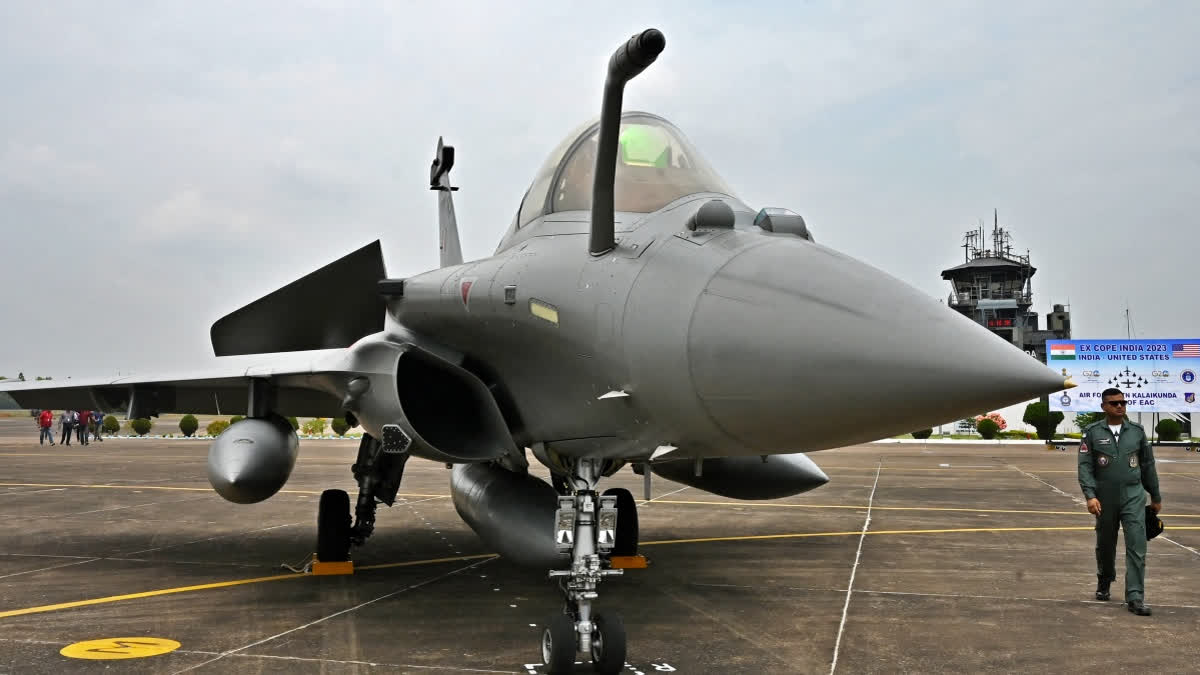New Delhi: India is leaving no stone unturned to enhance its military prowess in light of China's growing influence in the strategically crucial Indian Ocean region. In a significant development expected in 2025, India is poised to ink agreements with France for the acquisition of 26 advanced Rafale-M fighter jets, renowned for their agility and combat capabilities. Additionally, the deal includes three more Scorpene-class submarines, known for their stealth and advanced technology, marking a transformative leap in India's naval strength and reinforcing its position in regional security dynamics.
Major General Dhruv Katoch ( Retd), views this as a 'positive development' while noting that this would enable India to better secure the sea lanes of communication from the East coast of Africa to the Straits of Malacca.
When asked about the strategic advantage for India, he told ETV Bharat that it will also help in a swifter response to unfolding events in the Persian Gulf and the Red Sea, especially considering India's dependency on the Gulf for its energy requirements.
"Indian naval capability acts as a deterrent against piracy and, in conjunction with other navies, facilitates the core idea of the Free and Open Indo-Pacific (FOIP), thereby establishing a rules-based international order and consolidating principles such as free trade, freedom of navigation, and the rule of law', he added.
He said, "This is a positive development. After India's first Indigenous aircraft carrier became operational in 2023, the next step was to equip it with air superiority fighter aircraft and the Rafale Marine aircraft—a 4.5 generation aircraft designed for multiple roles amply suits the bill. This will significantly enhance Indian Naval capability in the Indian Ocean Region. (IOR). Under Project 75, India had signed an agreement with France to construct six Scorpene class submarines. Five of these submarines have been commissioned, and the sixth is under trial. The three new submarines being acquired now are under Project 751- a follow-up to Project 75. To be procured under the buy (Indian) category, they will be built by Mazagon Dock Shipbuilders Limited (MDL) in collaboration with the French firm Naval Group and will have an indigenous content of 60 per cent".
"India has a very strong defence partnership with France. This will further strengthen defence ties between India and France. More importantly, France has been a reliable partner for India's defence needs", the defence expert said.
Major General Dhruv Katoch stated that the Rafale marine and scorpene submarine deals will help India maintain an edge in the Indian Ocean Region, while noting that China is making increasing forays into the IOR and has a string of bases in the region. However, India remains the dominant player in the Indian Ocean. "These acquisitions help India maintain an edge in the IOR. India's Naval capability will be significantly enhanced", Katoch added.
The deal for 26 Rafale-M aircraft with France is in the final stage. These Navy variant Rafale aircraft are soon to join the Navy fleet. Not only this, the deal for 3 Scorpene submarines for the Indian Navy is also in the final stages.
The Indian Navy is poised for a major expansion, with plans to acquire a total of 96 ships and submarines over the next decade, underscoring its commitment to maritime strength. The government has sanctioned the development of two advanced nuclear-powered submarines (SSNs), with an ambitious intention to ultimately build six. According to the Navy Chief, Dinesh Kumar Tripathi, the first SSN is slated for completion by 2036-37, followed by the second in 2038-39. Furthermore, last July, the Defence Ministry greenlit the acquisition of Rafale-M jets from France, which will play a crucial role in operations from the indigenously developed aircraft carrier INS Vikrant.
Recently, the Navy Chief expressed concern over Pakistan's strategic choices, highlighting how its current economic challenges have led to prioritizing military expenditure at the expense of its citizens' welfare. He noted China's substantial involvement in Pakistan's shipbuilding initiatives, emphasizing that many of the vessels destined for Pakistan are being built in China or with Chinese assistance. This circumstance reinforces India’s resolve, as the Navy Chief asserted that India stands fully prepared to navigate any challenges posed by its neighbours
India's naval capabilities are robust, with a focus on modernizing and expanding its fleet to ensure its dominance in the Indian Ocean Region (IOR) and safeguard national interests. India’s naval strategy focuses on securing sea lanes of communication, protecting vital maritime chokepoints, and countering threats from adversarial nations. Its naval doctrine emphasizes power projection, maritime security, and strategic deterrence. However, India’s focus on the Indian Ocean is central, as the region is vital for global trade and energy supplies. The Indo-Pacific strategy is becoming increasingly important as India strengthens maritime ties with global powers like the United States, Japan, and Australia, through initiatives like the Quad.
It is pertinent to note that India is working to modernize its navy by acquiring advanced technologies, increasing its fleet size, and enhancing its combat capabilities. This includes acquiring new vessels, modernizing older ships, and integrating advanced radar, sonar, and weapons systems. The focus is also on enhancing its amphibious warfare capabilities and increasing the range and accuracy of its missile systems.



